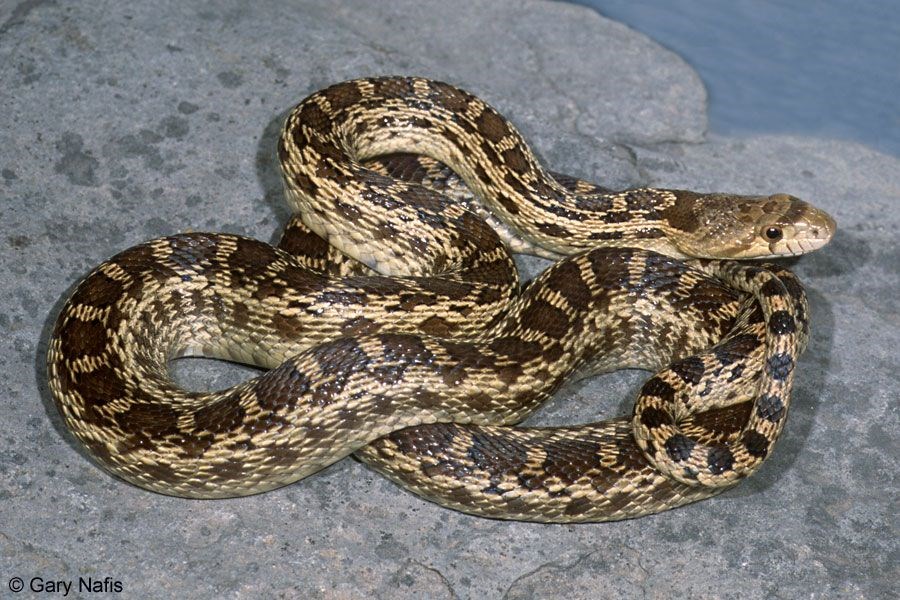Last updated: May 15, 2025
Article
Gopher Snake

Gary Nafis
General Description
The Pacific gopher snake (Pituophis catenifer catenifer) is a subspecies of the widespread gopher snake species and belongs to the constricting family Colubridae. Pacific gopher snakes can be large, with hatchlings reaching up to 20 inches (50 cm), and adults ranging in size from 2.5-7 feet (76-213 cm). These spotted snakes are sometimes confused for rattlesnakes (Crotalis spp.), but they are non-venomous and are not pit vipers. The Pacific gopher snake ranges from yellow to dark brown with gray coloring on the sides of the body, alternating with dark spots. Like other gopher snakes, the Pacific gopher snake can hiss loudly when agitated, and when threatened, this species will inflate its body, flatten its head, and vigorously shake its tail, which may produce a rattling sound if done in dry vegetation. Despite sometimes being confused for rattlers, they are not aggressive or harmful to humans.
Reproduction
Pacific gopher snakes mate in spring and are oviparous, laying 3-9 eggs in early summer which hatch 2 to 2.5 months later. In colder climates they overwinter without feeding.
Feeding
The gopher snake often enters rodent burrows in search of prey. It is usually diurnal, but can be active at night in warm weather. It uses constriction to kill its prey. Diet varies according to size, ranging from insects to rodents, lizards, and birds and their eggs.
Habitat and Distribution
P. catenifer catenifer occurs widely in low elevations of the Pacific states in grassland or open woodland environments, rarely occurring above about 2000’ (589 m) or in dense forest. It is also an invader of agricultural habitats, often hunting in bushy environments between fields. It abuts the range of the Great Basin gopher snake (P. c. deserticola) east of the Klamath-Cascades crest.
Conservation Status
P. catenifer catenifer is common throughout much of its range and is globally secure.
Where to see it in the Klamath Network parks
The Pacific gopher snake is documented at Redwood National and State Parks and Whiskeytown National Recreation Area. The closely related Great Basin gopher snake (P. c. deserticola syn. P. melanoleucus) is recorded from Lava Beds National Monument.
For further reading
http://en.wikipedia.org/wiki/Pacific_gopher_snake
http://www.californiaherps.com/snakes/pages/p.c.catenifer.html
Download a pdf of this article
Prepared by Daniel Sarr
NPS Klamath Inventory & Monitoring Network
Southern Oregon University
1250 Siskiyou Blvd
Ashland, OR 97520
Featured Creature Edition: March 2014
